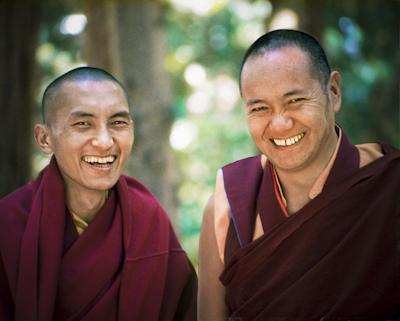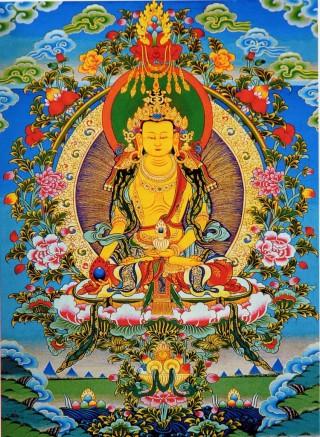E-letter No. 149: November 2015

Dear Friends,
We are so grateful to all of you for your support as we work together to bring these precious teachings to the world. Read on for updates and announcements from the month of November.
YEAR END APPEAL LAUNCHED
As many of you may have seen in our special mailing last week, we have launched our Year End Appeal with announcements of new multimedia titles and new video posted on our YouTube channel. We have recently released the first title in the multimedia series based upon Lama Zopa Rinpoche's Bodhisattva Attitude, titled Everything Depends On Your Attitude. The next title, Cutting the Concept of Permanence, will be released in December.

Our multimedia titles start with the teaching transcript, which is then enhanced with images, audio and video from that teaching plus informal video, advice on the same topic and other related material in the Archive. By weaving Archive resources together in this way we hope to provide the means for you to deepen your experience of the teachings—the next best thing to having attended the teachings in person.
This is an exciting time at LYWA and we invite you to join us in advancing this incredibly beneficial work, making these precious teachings available to everyone in all ways possible. Your show of support for our Year End Appeal is extremely important to the mission of the Archive as it enables us to end the year on a solid financial footing and to advance our work into the new year more smoothly.
Please know how much we appreciate your support of the Archive and rejoice together as we continue to bring these precious teachings to the world.
Kopan Ebook Series Complete

We are pleased to announce the release of the 4th and final book in the Kopan series, Lamrim Teachings from Kopan 1991 titled Cherishing Others: The Heart of Dharma.
In these teachings Rinpoche emphasizes the benefits of renouncing the self-cherishing mind and cherishing others. Rinpoche concludes the month-long course with advice to students on how to practice Dharma in the West, and offers refuge and a teaching on the benefits of taking vows.
Over the past year, we have been releasing volumes that comprise all the teachings that Rinpoche gave at the 24th annual Kopan lamrim course in 1991. We hope that the four volumes of lightly edited transcripts convey the feeling of being in Nepal for the one-month course.
The first volume is titled Practicing the Unmistaken Path and covers topics such as compassion and universal responsibility, the benefits of developing bodhicitta, and the disadvantages of self-cherishing. The second volume is Creating the Causes of Happiness and includes topics such as the nature of the mind, karma, death, reincarnation and emptiness. The third volume is Cutting the Root of Samsara and presents a clear discussion on sexual misconduct, an explanation of karmic appearance and emptiness, and a commentary on the eight Mahayana precepts motivation.
You can find links to ebooks for the entire series on Smashwords, where you can download files for any and all ebook readers. And, if you are an LYWA Members, you can freely download all books from our Members Area.
New Teachings and Advice on Our Website
We have just posted a teaching that Lama Yeshe gave at the 10th Kopan lamrim course in 1977 titled Emotional Ambition. In this talk, Lama discusses how what we normally experience as happiness is temporary and in actuality only leads to unhappiness. There are many othere talks we have posted from this course, including a number of excerpts from Lama Zopa Rinpoche's teachings, and a pdf of the entire transcript. You can find links to all of these here.

We have also posted a talk from Lama Yeshe with his vision for Universal Education. This is the transcript of an interview conducted by Ven. Connie Miller in Italy in September 1983. The Foundation for Developing Compassion and Wisdom, an international project of the FPMT, grew from Lama Yeshe's vision.
New to Lama Zopa Rinpoche's Online Advice Book is a long advice from Rinpoche on The Importance of Practicing Patience. In this advice Rinpoche writes about the importance of practicing patience and the good heart in order to bring peace and long-lasting happiness in our relationships, and how it is that even if we can't generate compassion to others, at least we should avoid getting angry.
Other new advices include:
- Think About the Continuation of Life: A student wrote that his family was going through a difficult time and he was concerned that his father was having suicidal thoughts. Rinpoche advised that, “whenever suicidal thoughts come, the remedy is to think about reincarnation, the continuation of life.”
- Rejoice in Your Sickness: Rinpoche advised a student who was experiencing many health obstacles to rejoice.
- The Purpose of Chemotherapy: Rinpoche said that every time she takes medicine or has treatment, she should think that the purpose is to be able to benefit numberless sentient beings.
- A New Center Building: Rinpoche wrote to thank a student who agreed to help build a new center.
As always, you can see the list of all newly-posted advices on our View and Search Online Advice Book page on our website.
MANTRAS ADVISED BY LAMA ZOPA RINPOCHE
Ven. Roger Kunsang wrote in an email to FPMT centers, projects and services in California in early November: “Lama Zopa Rinpoche has been bringing it up many, many times and feels that this is extremely important: it is inevitable an earthquake will happen in California and according to Rinpoche it seems next year is quite possible. Rinpoche has checked and below are some things that need to happen as soon as possible.”

Rinpoche advises that the following needs to be completed by February 2016:
- 1,800,000 recitations of the long Kshitigarbha mantra done as part of a Kshitigarbha practice;
- Taking the Eight Mahayana precepts 300 times;
- Performing the extensive Medicine Buddha puja (ongoing); and
- Reading of the Tengyur four times (to be done at Sera Je Monastery.)
The advice was given to Bay Area students to do these practices, but Rinpoche said that students around the world can also participate with the mantra accumulation, sending in their counts. “We need to accumulate 163,099 mantras weekly--23,300 daily--by January 31 in order to meet the goal,” said Ven. Tenzin Tsomo at Land of Medicine Buddha. “Basically, we need a lot of people to help contribute mantras. To give you an idea, if everyone is willing to commit 21 mantras a day, we still need over 1,000 people,” Ven. Tsomo said.
FPMT Bay Area centers have created a website with more information and ways to make pledges and report mantra recitations; contribute to the Tengyur recitations; and report the taking of the eight Mahayana precepts. See also Rinpoche's Online Advice Book.
Lama Zopa Rinpoche compiled a new Kshitigarbha practice that is available as a free PDF download for people to do who want to contribute their recitations of the Kshitigarbha long mantra. There is also an MP3 of Rinpoche chanting the long Kshitigarbha mantra. Rinpoche said that the dedication for all the above practices should be to pacify all earthquakes in California, Nepal and worldwide as well as the normal FPMT dedications. Please help out if you can.
THE HOLIDAY SEASON
As we head into the holiday season, we know that many of you are buying gifts for friends and family members online. Some of you may be familiar with Amazon.com's program to support non-profit organizations, Amazon Smile. When you shop through smile.amazon.com the Archive receives 0.5% of the sale as a donation.The first time you visit the site, it will ask you to choose an organization. Just type in Lama Yeshe Wisdom Archive and it will find us. This is an easy way to transform a worldly activity into a Dharma activity!
And, for those of you who might be inclined to donate on Giving Tuesday, December 1st, please keep Lama Yeshe Wisdom Archive in mind. Created by 92nd Street Y—a cultural center in New York City founded in 1874—Giving Tuesday has become a movement that celebrates and supports giving and philanthropy to offset the growing popularity of the consumer-driven "Black Friday" and "Cyber Monday".
Thank you again for all your incredible support. Please enjoy this excerpt from Rinpoche's teaching in UK in 2014.
Much love,

Nick Ribush, Director
Lama Zopa Rinpoche: Tomorrow or the Next Life?

Which will come first, tomorrow or the next life?
In A Guide to the Bodhisattva’s Way of Life, Shantideva said,
If when I have a chance to live a wholesome life
My actions are not wholesome,
Then what shall I be able to do
When confused by the misery of the lower realms?
If we don’t practice Dharma now, when death suddenly comes and we have gone to the lower realms, what can we do at that time? In their previous lives, even hungry ghosts or animals such as spiders or ants might have been billionaires in a rich country. From living in a house worth many billions of dollars they become a cricket. Can you imagine it? This can happen.
If we were to be born in hell with the most unbelievable suffering, what could we do at that time? Nothing. Every hope would be gone, finished. Because we did not practice when we had the chance it would be too late. Our life and death would be over and our rebirth in the lower realms already begun.
A tiny fire spark from hell is sixty times hotter than all the fire of the human world put together. That is how hot it is. Compared to that, all the fire of our world is like an air conditioner, like snowflakes dropping from the sky. It’s nothing. This is also mentioned in A Guide to the Bodhisattva’s Way of Life.
One time I was walking up from His Holiness’s temple in McLeod Ganj, Dharamsala, to Tushita Retreat Centre when I saw many monkeys on the road. I thought that they have no freedom at all. They are totally under the control of karma and delusion; they have not the slightest freedom. For them, rebirth as a monkey has already happened and there is nothing they—or we—can do about it; nothing can be dome to immediately change it. It has already happened and they have to finish their karma. They are dro-wa, transmigratory beings, under the control of karma and delusion.
This is true of whatever animal we look at. It has happened. Tigers are completely under the control of karma and delusion and there is no freedom at all for them. The tiger rebirth has already happened because the causes of that rebirth were not purified before, and that is because the being that is now a tiger did not meet the Dharma before. To a tiger its life is the most precious thing, but karma forces it to eat other living beings—deer, zebra and other pitiful animals—that also only want happiness and do not want suffering at all.
We have been in this situation numberless times. We have been born as a tiger in the past numberless times and have been forced to eat numberless sentient beings. In the past we have eaten every sentient being! There is no beginning to our life in samsara; our rebirths are infinite. Being reborn as a tiger and eating those pitiful animals numberless times is just one type of rebirth we have had. We have been reborn as countless different types of sentient beings and have eaten every other living being numberless times.
There is no sentient being we have not eaten. In the past, you have eaten me numberless times; I have eaten you numberless times. This might come as a big shock but that’s what has happened.
This is the same rationale as when we meditate on the kindness of the mother, how the mother has been kind to us numberless times. It is very fearful. The only thing is that we cannot remember our past lives. We don’t even remember coming from our mother’s womb or the nine months spent in her womb.
During the one-month Kopan course we do a meditation on the continuity of the consciousness where we think about how today’s consciousness comes from yesterday’s and yesterday’s comes from that of the day before and how this year’s consciousness comes from last year’s and the year before that and before that, right back to childhood, right back to when the consciousness entered the mother’s womb.
After one of these meditations a nun from Israel said she remembered coming out from her mother’s womb. But most people don’t remember even that, so how can they say that past lives do not exist? Asserting that there are no past lives because they don’t remember them, they would also have to assert that they had not existed in their mother’s womb for nine months. How could they say that? That is completely wrong, completely stupid. Everybody knows they have come from their mother’s womb.
How can we assume something has not happened just because we can’t remember it? There are so many things from this life’s childhood that we cannot remember, so using that way of thinking we would have to assert that we had never done them. Using an inability to remember as proof of something’s not happening is very funny logic, very strange logic.
A popular quote says,
You cannot be sure which will come first,
Tomorrow or the next life,
Therefore, do not put effort into tomorrow’s plans
But instead it is worthwhile to attend to the next life.[1]
We just cannot be sure which will come first, tomorrow or our next life. Because of that it is unbelievably worthwhile to work for the next life, to attend to the next life by accumulating merit to not be reborn in the lower realms. Then, if we were to die tomorrow, our work would have been done. And even if we do not die tomorrow, our work has still been done.
This is what Lama Tsongkhapa said in Lamrim Chenmo: by practicing Dharma with the thought that we might die today, if we do die we have made the preparation, and if we don’t die then we have further opportunities to collect more merit. Therefore, thinking, “I’m going to die today” and working for future lives, practicing Dharma to benefit our future lives, is most worthwhile.
One way that the Kadampa geshes defined Dharma was that it is something that benefits future lives; something that brings happiness in future lives. If what we are practicing does not do that, it is not Dharma. Another way they defined it was that if any action of our body, speech and mind becomes an antidote to delusion, it is Dharma; if it does not become an antidote to delusion, it is not Dharma. This is how the Kadampa geshes differentiated between what is Dharma and what is not.
Edited by Gordon McDougall from Lama Zopa Rinpoche’s teachings at Jamyang Buddhist Centre, London, July 2014. Forthcoming in a book from Lama Yeshe Wisdom Archive in 2016.
Note: [1] Also quoted in Liberation in the Palm of Your Hand, p. 311. No source given.
